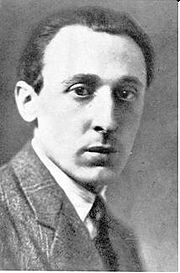Bruno Jasieński
| Bruno Jasieński | |
|---|---|

Bruno Jasieński
|
|
| Born | Wiktor Zysman 17 July 1901 Klimontów, Congress Poland |
| Died | 17 August 1938 (aged 37) Butyrka prison, Moscow, Soviet Union |
| Occupation | Poet |
| Language | Polish |
| Nationality | Polish |
| Ethnicity | Polish-Jewish |
| Notable works |
But w butonierce "Pieśń o głodzie" (Song of Hunger) |
Bruno Jasieński pronounced [ˈbrunɔ jaˈɕeɲskʲi]; born Wiktor Zysman (17 July 1901 – 17 September 1938) was a Polish poet and leader of the Polish futurist movement in the interwar period, executed in the Soviet Union during the Great Purge. Today one of the streets of Klimontów is named after him. Jasieński is one of the best known Polish futurists, acclaimed by members of the various modernist art groups as their patron. An annual literary festival "Brunonalia" held in Klimontów, Poland, is also named after him.
Wiktor (Bruno) Zysman was born at Klimontów to a Polish Jewish family of Jakub Zysman. From his mother's side he was a descendant of the Christian nobility (Pol. szlachta). His Jewish father Jakub was a local doctor and a social worker, member of the Klimontów intelligentsia. Jakub converted to Protestantism to be able to marry Eufemia Maria Modzelewska, a Polish Catholic and member of the Modzelewski family of the Bończa coat of arms. They had three children: the first-born Wiktor (Bruno Jasieński), Jerzy, and Irena.
Little is known of Jasieński's early life, especially as he did not describe it in his works. He attended high school in Warsaw, but didn't finish it. In 1914, as the First World War raged on, his family relocated deeper into the Russian Empire, where Bruno graduated from the secondary school in Moscow. There, his fascination with Igor Severyanin's ego-futurism started, followed by lectures of Velimir Chlebnikov, Vladimir Mayakovsky and Alexiey Kruchonykh's so-called Visual poems. In 1918, after Poland regained its independence, Bruno returned to Kraków, where he applied for a position in the philosophical faculty of the Jagiellonian University. However, he suspended his studies to join the volunteer unit of the Polish Army and took part in the disarming of Austrian and German soldiers. After the Polish-Soviet War (February 1919 – March 1921), he returned to University and studied at various faculties (including philosophy, law and Polish literature). He also became one of the founders of a club of futurists named Katarynka (Hurdy-gurdy).
...
Wikipedia
